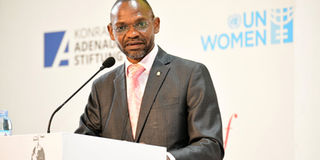Prime
Ugandans urged to embrace positive peace for national development

Assoc Prof Umar Kakumba the Deputy Vice Chancellor in charge of academic affairs at Makerere University. Photo | Busein Samilu
What you need to know:
Speaking at the event organized under the theme “Achieving peace through collaboration and community engagement,” the Deputy Vice Chancellor of Makerere University, Associate Professor Umar Kakumba commended the Rotary Peace Center for greatly contributing to community development
Makerere University Rotary Peace Center in partnership with the Department of Religion and Peace Studies has urged the public to strengthen their resolve to create a more peaceful and just world.
Speaking at the event organized under the theme “Achieving peace through collaboration and community engagement,” the Deputy Vice Chancellor of Makerere University, Associate Professor Umar Kakumba commended the Rotary Peace Center for greatly contributing to community development.
He urged all Ugandans to embrace the different cultures, aspirations, and traditions of the members of the community to live in a more peaceful world. “Peace is not the absence of war. You can still have a lack of tranquility even when there is no war,” he added.
The youth were advised to play their role in ensuring peace through economic empowerment because underdevelopment in itself is a threat to peace. “Peace is an ongoing process that requires perseverance. Knowing this is crucial to understanding and co-existence,” said Nahla Elshall, the class leader of the Makerere University Rotary Peace Fellowship Programme cohort 5.
Being affected more by the impact of violence as compared to men, women were also urged to be part of the peace-building process in their respective communities. “Traditionally, women were marginalized when it came to issues of land ownership. If we strengthen the informal justice factors in gender-responsive administration of justice, then we will see an improvement in community relationships, a reduction in land-related conflicts, and women will be actively involved in decision-making processes at community levels,” said Mr. James Grant Opiyo, a Fellow at the Makerere University Rotary Fellowship.
However, the media on the other hand was encouraged to embrace peace-based reporting and avoid fueling conflicts to achieve positive peace. "The media can be the voice of the many women who are affected by conflicts. There are many conflicts at the moment that we cannot solve now but we can work to ensure that these conflicts are not repeated in the future. The only way to do that is to concentrate on positive peace, especially on the empowerment of civil society, which is one of the pillars of positive peace,” said Miss Sara Formisano, a consultant in gender and peace security.




